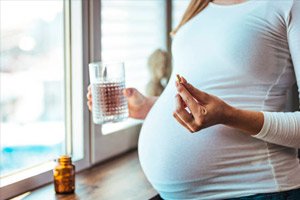
All iLive content is medically reviewed or fact checked to ensure as much factual accuracy as possible.
We have strict sourcing guidelines and only link to reputable media sites, academic research institutions and, whenever possible, medically peer reviewed studies. Note that the numbers in parentheses ([1], [2], etc.) are clickable links to these studies.
If you feel that any of our content is inaccurate, out-of-date, or otherwise questionable, please select it and press Ctrl + Enter.
Vitamins C and E during pregnancy may reduce risk of wheezing in children
Last reviewed: 09.08.2025

Australian scientists from the University of Newcastle have published the first comprehensive systematic review and meta-analysis of the effects of maternal intake of vitamins A, C and E on the risk of respiratory symptoms in children under five years of age in the Journal of Human Nutrition and Dietetics. The analysis included data from 12 observational studies (58,769 mother-child pairs) and six randomised controlled trials (RCTs) on vitamin C and E supplements.
Prerequisites
Acute and chronic respiratory disease in children (wheezing, asthma, respiratory distress syndrome) causes a significant burden on families and the health care system. Antioxidants - vitamins C and E - could protect the fetal lungs from oxidative stress, especially if the mother smokes or has an inadequate diet.
Study design
- Observational cohorts assessed usual dietary intakes ranging from low to high vitamin intakes using food frequency questionnaires and food diaries among pregnant women.
- The RCTs included smoking mothers who were given 500 mg of vitamin C daily or placebo from the second trimester until delivery. Two trials followed children up to 1 year (n=206) and one followed children up to 5 years (n=213).
- Outcomes: primary outcome – presence of wheezing in the child; secondary outcome – development of respiratory distress syndrome (RDS) in newborns.
Key Results
Vitamin C in Smoking Mothers
RCTs showed a statistically significant reduction in the risk of wheezing in children:
By 12 months – by 30% (RR≈0.70; p<0.05).
By 5 years – by 35% (RR≈0.65; p<0.05).
Observational data on non-prayers strongly supported the trend, but the effect did not reach statistical significance (aOR 0.85; 95% CI 0.63–1.16).
Vitamin E from Food and Supplements
In two independent observational cohorts, mothers in the top quartile of vitamin E intake had a 36% lower risk of wheezing in their child at 2 years (aOR 0.64; 95% CI 0.47–0.87).
There were no RCTs for vitamin E, increasing the uncertainty of the evidence.
Combination C + E and Vitamin A
Two RCTs comparing the vitamin C+E combination with placebo found no effect on the risk of RDS in neonates (OR 1.15; 95% CI 0.80–1.64).
Vitamin A has not shown significant effects in either observational studies or clinical trials.
Quality of evidence and limitations
- Moderate (for RCTs on C and RDS) and very low (for observational data) evidence according to GRADE.
- Heterogeneity of studies by methods of assessing vitamin intake and by age of observation of children.
- Lack of RCTs for vitamin E and complete lack of large trials for vitamin A.
Clinical and practical implications
- 500 mg of vitamin C daily during the second and third trimesters is recommended for smoking pregnant women to reduce the risk of wheezing in children in the first years of life.
- High vitamin E intake (≥ 15 mg/day) may confer additional protection but requires confirmation in an RCT.
- Combination therapy of C+E and vitamin A has not been shown to be beneficial in preventing RDS or infantile wheezing.
Prospects
The authors call for large randomized trials:
- for vitamin E during pregnancy with long-term (≥ 5 years) follow-up of respiratory outcomes in children;
- for vitamin C among different maternal groups (not just smokers) to assess the breadth of the effect;
- for vitamin A in case of deficiency in the diet.
If confirmed, these data may form the basis for updated recommendations for prenatal dietary support, particularly for high-risk groups for childhood respiratory disease.
